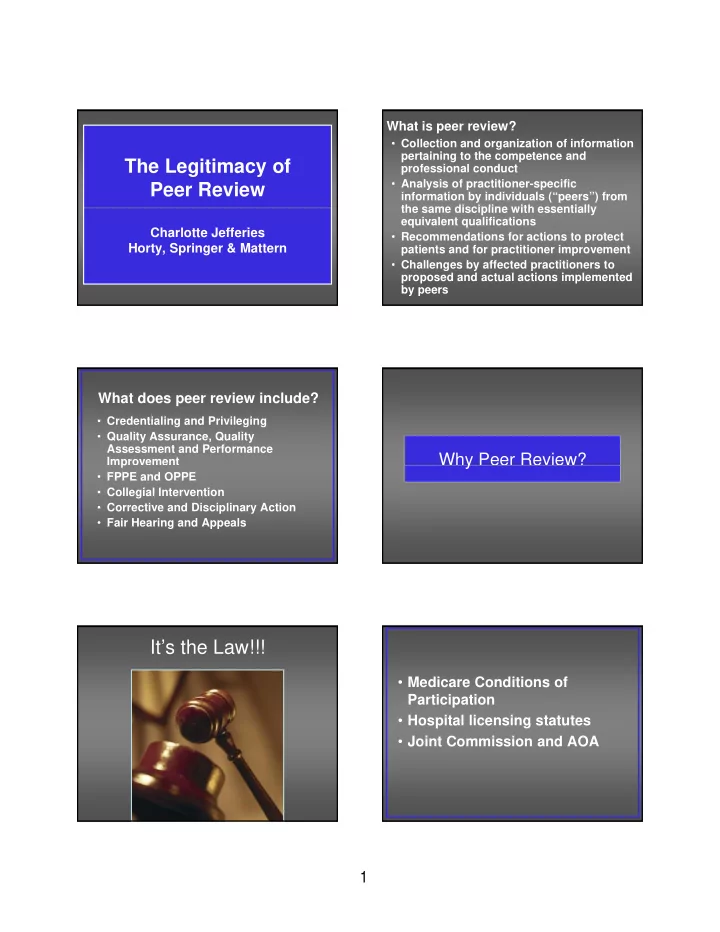

What is peer review? • Collection and organization of information pertaining to the competence and The Legitimacy of professional conduct • Analysis of practitioner-specific Peer Review information by individuals (“peers”) from the same discipline with essentially the same discipline with essentially equivalent qualifications Charlotte Jefferies • Recommendations for actions to protect Horty, Springer & Mattern patients and for practitioner improvement • Challenges by affected practitioners to proposed and actual actions implemented by peers What does peer review include? • Credentialing and Privileging • Quality Assurance, Quality Assessment and Performance Why Peer Review? y Improvement p • FPPE and OPPE • Collegial Intervention • Corrective and Disciplinary Action • Fair Hearing and Appeals It’s the Law!!! • Medicare Conditions of Participation • Hospital licensing statutes Hospital licensing statutes • Joint Commission and AOA 1
• DNV (Det Norske Veritas) It improves patient care and (NIAHO: National Integrated (NIAHO: National Integrated promotes patient safety! t ti t f t ! Accreditation for Healthcare Organizations or “DNVHC”) If the heart of a profession is self-regulation, then the Avoid hospital liability for medical staff cannot escape medical staff cannot escape negligent credentialing. the challenge to make peer review work. Why doesn’t traditional peer Why doesn’t traditional peer review work well? review work well? • Discomfort with critiquing a • Retrospective colleague – respect for autonomy • Rotating, untrained “volunteers” • Poor documentation • Poor documentation • Perception – punitive • Consumes time • Fear of “discovery” • “There but for the grace of • Fear of challenge God…” 2
What do we want from the peer review process? • Fair and objective • Confidential Don’t forget to document! Don t forget to document! • Educational • Educational • Good memory • Timely and efficient Follow up with good and bad news. and bad news FPPE Focused F Peer Review Professional P Process Practice P Evaluation E (a.k.a. Provisional Appointment) 3
Those who are new Those who are new “FPPE” “FPPE” • Appropriateness of treatment • Assess privilege specific competence. • Use of consults • Adequacy of documentation Those who are new OPPE “FPPE” Ongoing O Ongoing O • Chart review • Monitoring Professional P • Proctoring Practice P • External peer review E Evaluation OPPE OPPE • OPPE is required for • Routine evaluation to all practitioners who confirm appropriate have been granted practice clinical privileges, • Identify and address • Identify and address i including AHPs l di AHP issues early 4
OPPE OPPE Criteria may include: – Operative outcomes Operative outcomes – Blood usage – LOS • Department selects criteria for OPPE. – Morbidity and mortality – Use of consultants • Criteria will vary by department. – Medical records completion OPPE OPPE FAQ – 8/13/08 “The fact that a practitioner p doesn’t fall out on pre-defined screening criteria is not sufficient Once a year is not enough. to meet the requirement.” FPPE OPPE F Focused Focused P Professional Professional P Professional Professional • Review by Department Chair. Practice Practice P • Share with the physician. Evaluation Evaluation E • Consider at reappointment. 5
FPPE FPPE WHEN CONCERNS ARE RAISED • Referrals from hospital staff and Medical Staff members/reported concerns • Patient complaints • Chart review • Protocol/guideline not followed • Protocol/guideline not followed • Monitoring • Noncompliance with Rules/Regs/ • Simulation Medical Staff Policies • Proctoring • Litigation risks • Medical necessity • External peer review • Sentinel events • Discussion with others involved in the care of each patient • Specialty Specific Indicators • OPPE Outliers Goals: • Work with physician to Collegial Intervention: resolve concerns. The First Step in the • Improve patient care. Performance Improvement Process Performance Improvement Plans • Additional education/CME • Prospective monitoring/review Know your objectives and plan • Second opinions/consultations for the intervention. f th i t ti • Concurrent proctoring • Formal evaluation/assessment • Additional training 6
Progressive Steps Tip Tip Continuum Don’t Sacrifice Don t Sacrifice Educational Collegial g Disciplinary p y letter conversation action Performance Patient Safety for Improvement Plans Non-Reportability Not reportable to NPDB In the rare case when collegial intervention is unsuccessful… Investigation 7
Recommend
More recommend